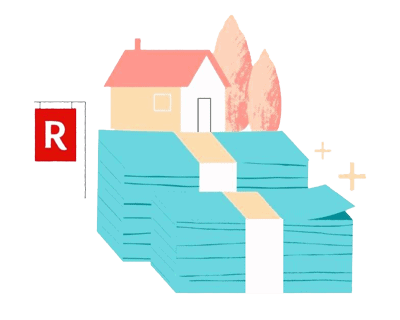
There are many reasons one might want to find out who owns a property or piece of land. Suppose you’re on a walk in Nashville, TN, and you pass by a home that you instantly fall in love with and want to buy – perhaps an antique Victorian home or a beautiful abandoned carriage house . Or maybe you’re just curious about who owns a house in your neighborhood or a piece of land on the edge of town. Well, the good news is that you can usually track down this information pretty easily.
In most cases, property ownership information is available for free online (just ensure the website you use is legitimate). If that doesn’t work, or if you’re looking in more rural areas, you’ll have to go to a local government agency, title company, or broker.
We’ll break each of these methods down to help you find out who owns a property.

Before using any information gathering methods, it’s essential to find the exact address of the real property (the parcel of land and everything that is permanently attached to it – often shortened to just “property”). There are three common ways to do this:
If you’re only looking for who owns a house, all you need is the address. However, if you’re looking for a property, you need the identification number. This number is separate from the address and is essential to determining who owns a property. Unfortunately, there are 3,143 counties in the U.S., many of which use different property identifiers , so the number can be challenging to find. It’s usually located on a property’s tax bill or assessment notice, so going to your county can be a good place to start.
Once you have the property number and/or address, you can begin searching for who owns that dream property or house.



The easiest way to find out who owns a property or house is to search for the address or property number online. Websites like Whitepages offer reverse searching services, and brokerages like Redfin have ownership information at the bottom of most listings. Keep in mind that information may be incomplete and inaccurate.
Another option is to go to your county’s website and look for a property that way. Many counties have online portals with all of this information in one easy place. If that doesn’t work or if you’re looking for more details, your next best option is to reach out to your county’s tax assessor.
A majority of people who own private property must pay property tax on it (often excluding churches, libraries, schools, and religious buildings, among others). They pay these taxes to their county, which are collected by the county treasurer (often called the collector’s office). The county assessor determines a property’s true and fair value and retains a record of them.
So, if you’re wondering who owns that property next door, the best place to start is by going to your local tax assessor’s office. Assessors provide free, easy, and comprehensive ownership data for every registered property in their county. You’ll also get to see any special assessments associated with the property, like loans and other financial information. However, the information may be outdated depending on when it was registered.
Check with your local government office, call their information line, go to your city hall or meeting place, or email the office if you have any questions.

Some properties aren’t listed with tax assessors for numerous reasons – perhaps it’s unregistered land, there was an administrative error, or nobody has ever paid taxes on it. If the county assessor couldn’t help, your next step is to contact the county clerk, sometimes called the register of deeds or recorder’s office.
The county clerk often has a record of property deeds. When you find the deed, it should have the signature of the property owner, as well as the address and contact information. Depending on how long ago the deed was recorded, it may be out of date.
Most of the time, the information is available online but varies by location.
Depending on your locality, you may be able to manually search through the local registry of deeds. This isn’t available everywhere, so contact your county if you have questions.
If the county can’t help you figure out who owns a property, your next step is to go to a local title company. “Title companies are experts at locating property information,” says Reid Hayton-Hull, Principle Counsel for Title Forward , a Redfin company. “They don’t typically become involved with a transaction until the property is under contract to be sold, at which point they search the property’s title and identify any issues with the current owner’s title. However, some companies may offer pre-contract searching services for a fee. Check with local title companies to see if they offer such services. ”
If you’re committed to buying an abandoned property or empty lot, paid online property search services can be a great option for finding the owner. Many property data tools can pinpoint the current owner and even provide contact details and information about the land registry. You may also discover any existing liens or debts, which may help guide your next steps.
Online services can be expensive and are often complicated and full of jargon. If you take this route, prepare to invest a significant amount of time and money.
Mailing list brokers are an online information-gathering service that is ideal for bulk information gathering and outreach. People use them for various reasons, real estate being a common one. Mailing list brokers gather detailed contact information for homeowners, property owners, businesses, and more and send them to their clients.
If you tell the broker what you’re looking for, you can have them look up property ownership for any number of properties or homes. They will provide you with lists containing every property’s information and contacts. Keep in mind that these services can be expensive and incomplete.

Agents or real estate investors may already have access to informational lists you would otherwise have to pay for. If you have a friend or family member that is a real estate agen t, ask for a favor. They also can provide advice if you’re navigating an online service.
If the other options here haven’t worked yet, ask a real estate lawyer for help. They may have ideas for where else to look and might have contacts within the county.
When all else fails, try knocking on the door of that perfect house you want or leave a note if nobody is home. You may end up face-to-face with the current owner or talk to someone who knows the owner. If nobody answers, consider leaving a message with your contact information.
This can be the riskiest and most direct method, however, you may get your answer quickly and easily.
It can be confusing to find out who owns a property, so let’s recap:
When you search for properties, always be cautious about misinformation and companies that use bad practices. Try not to be intrusive, and talk to the county if you have any questions.
Discovering who owns a property is usually simple and has many advantages. You can guarantee that you’re talking with the legal owner of the property, and you may be able to convince them to sell even if it’s not on the market.
If you are represented by an agent, this is not a solicitation of your business. This article is for informational purposes only, and is not a substitute for professional advice from a medical provider, licensed attorney, financial advisor, or tax professional. Consumers should independently verify any agency or service mentioned will meet their needs. Learn more about our Editorial Guidelines here.

Jamie is part of the Content Marketing team at Redfin and has spent 2+ years writing about climate change, housing affordability, and the housing market. He fell in love with writing in college, where he decided he wanted to help others understand complicated topics. He was born and raised in Seattle, where he currently lives with his wife and three pets. His dream home is a small, modern house in the forest where he can hear the wind blowing at night.